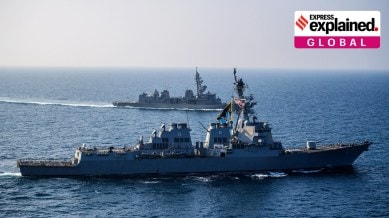As part of a maritime security initiative in the Red Sea named Operation Prosperity Guardian, the United States military said Sunday (December 31) that its forces opened fire on Yemen’s Houthi rebels.
The USS Gravely destroyer first shot down two anti-ship ballistic missiles fired at a Maersk ship passing through the southern Red Sea on Saturday, after the vessel reported getting hit by a missile earlier that evening, AP reported. The Houthis confirmed 10 casualties.
The recent attacks on ships passing via the Red Sea, a crucial trade route that connects the Mediterranean Sea and the Indian Ocean, have prompted many businesses to pause the movement of cargo.
Yemen-based Houthis, a clan belonging to an Islamic sect, have claimed responsibility for the attacks – launched to protest Israel’s ongoing military strikes on the Gaza Strip. A ship passing by near the coast of Gujarat was also targeted via a drone last week.
The US Secretary of State Lloyd Austin had announced the joint security initiative to aid the safe movement of ships in December 2023. However, a few days on, many US allies have yet to commit to the operation.
Initially, it was reported that 9 countries were joining the operation – the United Kingdom, Bahrain, Canada, France, Italy, Netherlands, Norway, Seychelles and Spain. But missing from the list are other major US partners, such as Australia, Japan, and most Arab nations, including Saudi Arabia. But why? There are multiple factors at play here.
In the Middle East, it’s about the stand so far on the Israel-Hamas conflict.
Story continues below this ad
Bahrain is the only Middle Eastern nation to have joined the operations. “But this is no surprise: the small nation is home to the US Navy’s 5th Fleet,” states a DW report.
It adds that while other countries are losing money with the re-routing of ships away from the Red Sea and the Suez Canal, there is an apprehension towards taking a firm stance against the Houthis.
For decades, ever since the creation of Israel in 1948, Arab countries have claimed a principled opposition to it and supported the cause of Palestine. Even as several countries have sought to normalise relations with Israel in recent years, its continuous military action against Gazans – mostly civilians, women and children – has now drawn condemnation globally from a human rights perspective.
In this regard, the cause of Palestine has again gained centre stage. In October, various Arab countries – United Arab Emirates, Jordan, Bahrain, Saudi Arabia, Oman, Qatar, Kuwait, Egypt and Morocco – condemned what they called Israel’s “flagrant violations of international law” in response to the October 7 attacks from Hamas.
Story continues below this ad
Joining a grouping that is decidedly against the Houthis’s purported protest action would potentially open these countries to criticism over their prior stand.
Saudi Arabia, in particular, has played a role in supporting the anti-Houthi forces in the Yemen civil war. In around a decade since the war began, the Houthis seem to have seized and held onto power and Saudi Arabia now seems unwilling to invest further in the conflict. It is now participating in peace talks. Simultaneously, it is pursuing closer ties with Iran, which is believed to be backing the Houthis. Thus, an explicit call against the Houthis would harm these efforts.
Some of these concerns might be common to other countries, too. US officials have said that more than 20 countries have already joined the Operation, but it has been reported that they are not willing to publicly declare themselves as partners.
Why other partners are reluctant
Among other countries too, there is some reluctance to fully commit to joining the mission. Spain’s defence ministry has said, “We will not participate unilaterally in the Red Sea operation.”
Story continues below this ad
Italy is sending Virginio Fasan, a naval frigate, to the Red Sea “to protect its national interests in response to specific requests made by Italian shipowners,” Reuters reported. It is not being done as part of the operation. Further, The Netherlands said it would send two staff officers and Norway said it would send 10 naval officers to Bahrain. Denmark said its participation would be in the form of sending one officer.
This general lack of enthusiasm perhaps also points to countries wanting to stay away from getting deeply embroiled in a global flashpoint, even as Israel continues its offensive. Just on December 30, Israeli Prime Minister Benjamin Netanyahu said that “the war is at its height” and can last “for many more months.”
Australia has said it will not be sending a ship or a plane, but tripling its contribution to the Combined Maritime Forces (CMF). It is a multi-naval taskforce that has 39 members – including India, Australia, Bahrain, Brazil, Canada, Egypt, France, Germany, Pakistan, the Philippines, Sri Lanka, the United Kingdom, the United States and Yemen. Operation Prosperity Guardian will be coordinated by the Combined Task Force 153, which was set up in April 2022 to improve maritime security in the Red Sea, Bab el-Mandeb and the Gulf of Aden.
Australian Defence Minister Richard Marles told Sky News of the choice to focus more on its own strategic concerns, saying, “We need to be really clear around our strategic focus, and our strategic focus is our region — the north-east Indian Ocean, the South China Sea, the East China Sea, the Pacific.”
